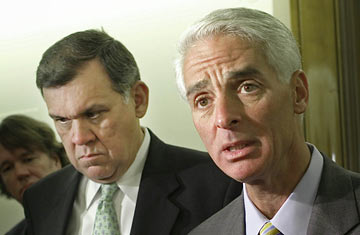
U.S. Senator Mel Martinez and Florida Governor Charlie Crist talk to the media after testifying about the impact of Hurricane Katrina and other natural disasters
Since he declared his candidacy for next year's U.S. Senate race, Florida's usually moderate Republican governor, Charlie Crist, has been accused of pandering to conservatives. He even opposed Sonia Sotomayor's appointment to the U.S. Supreme Court, a questionable move in a state with one of the nation's largest Latino populations. But since Florida GOP Senator Mel Martinez last week resigned the seat Crist is running for, the governor now has the rather weird duty of appointing an interim successor to the job he eventually wants. (He insists he won't appoint himself.) His choice could have a big effect on both his 2010 fortunes and whether Republicans as a national party can recover the female and minority voters they lost in key states like Florida last year.
Crist's choice, which he has promised to make before the Senate reconvenes next month, certainly won't be someone who could run against him in next year's GOP primary or steal too much of the political limelight until then. But he can still make a statement. The question is whether he wants to please the Republican Party's conservative base — the voters he apparently feels he needs to win Florida's closed primary — or appeal to the more centrist, nonwhite and nonmale electorate that the governor has made a career of reaching out to and that the GOP will need in the general election if it plans to climb out of the electoral crater it plummeted into in 2008.
Crist is likely to go the former — and safer — route by choosing an experienced, recognized Florida Republican. Some of the possibilities include former governor Bob Martinez, 74, and former state attorney general and secretary of state Jim Smith, 68, once a conservative Democrat who jumped to the GOP in the late 1980s and helped it become Florida's dominant party by the turn of the century.
Still, many indicators suggest Crist might help himself and his party by taking what prominent Florida political analyst Susan MacManus calls "the more forward-looking route for Republicans." Martinez, who also served briefly as chairman of the Republican National Committee, insists he's quitting the Senate to spend more time with his family. But the Senate's first Cuban-American member is also leaving under a cloud of frustration with his party's vitriol against immigration reform and the Sotomayor appointment. In 2008 the GOP's anti-immigration stance helped drop John McCain's share of the Latino vote to 31% — a 13-point plunge from the 44% George W. Bush won in 2004. Barack Obama not only won 67% of the total Hispanic vote last year, but he got a stunning 57% of that bloc in Florida, where the conservative Cuban-American vote usually holds sway.
The GOP also has a female problem. Obama won 56% of women voters in 2008, a 5-point increase over John Kerry's tally in 2004. And while about half of female Floridians voted for Bush in 2004, 52% went for Obama last year. As a result, says MacManus, a political-science professor at the University of South Florida in Tampa, "Crist could end up making a bold appointment when you consider how helpful a little diversity would be to the Republican image at this point."
One bold choice being floated is state representative Jennifer Carroll of Jacksonville, a Trinidad-born, African-American Republican who has been the state house's majority whip and deputy majority leader. A rising star in the Florida GOP, Carroll, 49, served 20 years in the U.S. Navy and retired as a lieutenant commander. Another is GOP state representative Anitere Flores of Miami. Flores, the current deputy majority leader, is only 32, and she's the legislature's only Hispanic female — which itself is a comment on both the Democratic and the Republican parties in Florida. Flores, who has also been mentioned as a possible candidate for lieutenant governor in 2010, would draw the younger, female and Hispanic voters the GOP lacks, but as a strong social conservative, she could help Crist with Florida's right wing.
Meanwhile, a lot of Floridians are asking why Crist is so spooked by the conservatives, led by his chief primary rival, state senator Marco Rubio. Crist, whose popularity since being elected in 2006 eclipses that of his more conservative predecessor, Jeb Bush, has already raised almost $4.5 million for his Senate run, compared with the less than $500,000 raised by Rubio. Crist won the 2006 primary in a landslide as a moderate — not all that difficult, given Florida's reputation as one of the nation's most politically centrist states — and his endorsement of John McCain helped that moderate Republican win Florida's presidential primary last year.
Martinez's early exit should itself be an encouraging signal to moderates that their approach is more viable. A former Orange County (Orlando) mayor and former U.S. Secretary of Housing and Urban Development, Martinez was ushered into the Senate in 2004 by the conservative Republican machine of George W. Bush's political guru, Karl Rove. (His primary campaign smeared his opponent as pro-gay just because he supported hate-crimes legislation.) But that GOP faction eventually exasperated Martinez. It's something Crist needs to think about as he mulls the best way to win the Senate's seat next year — and the best choice to fill it next month.
With reporting by Michael Peltier / Tallahassee
